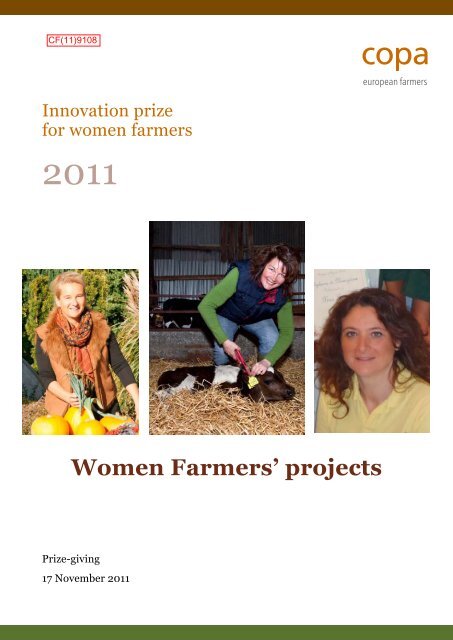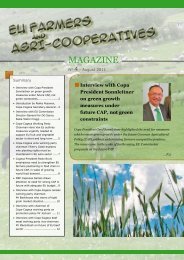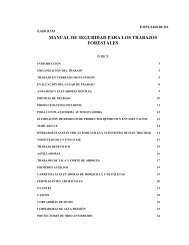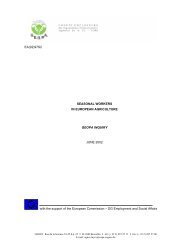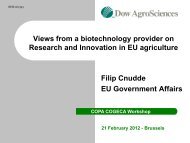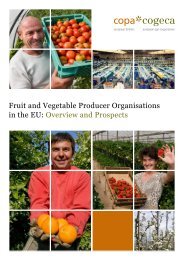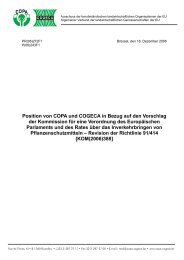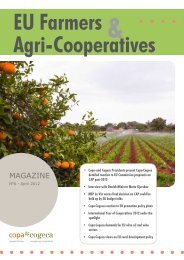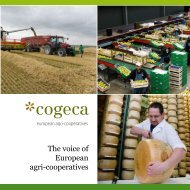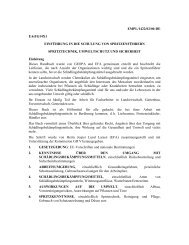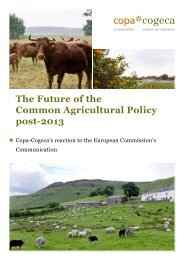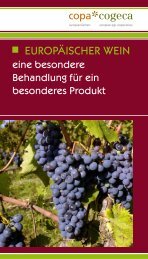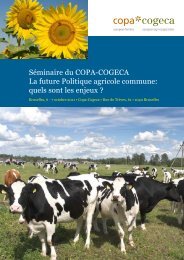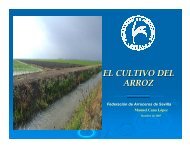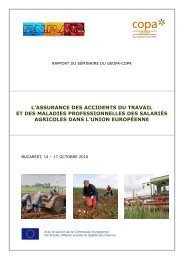Women Farmers' projects - Copa-Cogeca
Women Farmers' projects - Copa-Cogeca
Women Farmers' projects - Copa-Cogeca
You also want an ePaper? Increase the reach of your titles
YUMPU automatically turns print PDFs into web optimized ePapers that Google loves.
Innovation prize<br />
for women farmers<br />
2011<br />
Prize-giving<br />
<strong>Women</strong> Farmers’ <strong>projects</strong><br />
17 November 2011
2<br />
<strong>Women</strong> play an increasingly important role in many areas of<br />
life. They are the backbone of rural society. <strong>Women</strong> farmers<br />
represent over 35% of the agricultural workforce in Europe<br />
and it is important to recognise the benefits they bring to the<br />
sector. More and more, they take an active part in farming<br />
families decision-making. They play a key role in a vibrant<br />
and successful EU agriculture sector, providing food and<br />
services for 500 million consumers.<br />
In the wake of growing food demand, we are pushing for a<br />
dynamic, innovative and profitable Common Agricultural<br />
Policy (CAP) in the upcoming reform which ensures food<br />
security, enabling farmers to produce profitably and<br />
competitively to feed a growing population. <strong>Women</strong> farmers<br />
will play a major part in achieving this.<br />
The innovation award introduced by the <strong>Copa</strong> <strong>Women</strong>’s<br />
Committee aims to highlight areas where women have<br />
shown their expertise in being innovative and underline the<br />
activities and benefits that women can bring to agriculture.<br />
It also aims to stimulate adoption of further innovative,<br />
competitive practices. The prize, which is presented every<br />
two years, is awarded on the basis of criteria such as the use<br />
of new know-how, new methods or technologies in a given<br />
sector. The <strong>Women</strong>’s Committee was established in 1968,<br />
ten years after <strong>Copa</strong> was created, and holds a special place<br />
within the organisation.<br />
Pekka Pesonen<br />
<strong>Copa</strong>-<strong>Cogeca</strong> Secretary-General
It is not by mistake that the ancient Greeks put agriculture under the patronage<br />
of a female deity. Demeter was the goddess of agriculture, horticulture, grain and<br />
harvest. She was the keeper of the horn of plenty. It is not by mistake that there<br />
was another goddess, her daughter, Persephone, associated with the spring, with<br />
the seeds and the fruits of the fields, with the cycles of vegetation, which shoots<br />
forth in the spring and withdraws into the earth after the harvest. And there<br />
is not by mistake that another goddess, Athena was the deity for wisdom and<br />
reason!<br />
The vitality of our rural communities and their future, the alchemy of our<br />
farming households and their balance, the heart of rural economies and their<br />
dynamism, they all rely on the contribution that women bring. The Ancient<br />
Greeks knew it already in their time!<br />
<strong>Women</strong> in agriculture, women farmers, women entrepreneurs, women and<br />
innovation, have a key role to play for the future of our farming in Europe. We<br />
will continue to invest in motivating women to stay/become farmers, to promote<br />
the principle of non-discrimination, to boost innovation.<br />
Already, in the reformed CAP we have put forward, there are several tools<br />
to stimulate innovation for women, in the context of LEADER, business<br />
development, cooperation, training and knowledge transfer. Prioritising<br />
women's participation in these measures means <strong>projects</strong> that target women and<br />
female entrepreneurs, but also <strong>projects</strong> developed by women. There are further<br />
opportunities for innovative <strong>projects</strong> in the frame of the agricultural European<br />
Innovation Partnership. This will allow women farmers to take leadership,<br />
to learn and capture all the practical advantages of these agriculture research<br />
initiatives.<br />
It is with great pleasure that I am writing this few lines to introduce the Innovation<br />
Prize for <strong>Women</strong> Farmers. It is an initiative that deserves all the promotion and<br />
the awareness possible and I want to thank COPA for the role it plays in it.<br />
Dacian Cioloş<br />
EU Commissioner for Agriculture and Rural Development<br />
The second Prize for Innovation has seen a very large number of farms run<br />
by women from all over the European Union take part. Awarding a prize<br />
does not only enable us to increase the recognition of the value of women<br />
in agriculture, but also to get to know the kind of work carried out on these<br />
farms. Many very interesting farms participated, varying from farms where<br />
production is reconciled with family life, demanding reinvention on the farm, to<br />
multifunctionality. Many of the farms were excellent practical examples of short<br />
supply chains. Some were specialised in non-food products, such as flowers and<br />
others placed production alongside social activities, varying from activities with<br />
schools to providing a home to the elderly.<br />
All the farms which participated in the Prize for Innovation are examples of<br />
farming in a modern way, moving with the times, with the specific goal of<br />
making a profit. What we have seen is enormous creativity and the clear capacity<br />
to run a business; to earn an income whilst continuing to live in rural areas,<br />
protecting and safeguarding the areas that we live in.<br />
There are ever more women deciding to run farms and this is because they<br />
are secure in the knowledge that they can bring change, that they can breathe<br />
life into an agricultural sector which is reinventing itself. Understanding the<br />
market's needs and producing in accordance with these needs is vital, as is<br />
directing consumers towards informed choices for healthy living. <strong>Women</strong> are<br />
ready to do their bit!<br />
Adriana Bucco<br />
President of the <strong>Women</strong>’s Committee<br />
3
Innovation Prize<br />
for <strong>Women</strong> Farmers<br />
ONCE-A-DAY MILKING FARM<br />
Ann MOORE,<br />
Ballyspillane,Middleton, Co Cork, Ireland<br />
Irish Farmers Organisation (IFA)<br />
National Farm Family & Social Affairs Committee<br />
glencashfarm@gmail.com<br />
The innovation price for <strong>Women</strong> Farmers has been<br />
awarded this year to Anne Moore from the Irish Farmers<br />
Organisation (IFA) for her innovative Once-A-Day<br />
Milking Farm which is grass-based with 190 cows and<br />
focuses on low cost production of high quality milk<br />
Description of the farms’ structure and activities<br />
The farm, which is a Grass Based Low Cost System, is<br />
a substantial holding totalling some 127 hectares, with<br />
grass pastures on free draining rich soil. Currently, 190<br />
cows are milked on the farm, built up from just 28 cows<br />
in 1998. The Fresian herd has been crossed with Jersey<br />
bulls in recent years to optimise hybrid vigour and with<br />
Kiwi cross bulls in 2010/2011. Cows eat grass during the<br />
grazing season from February to November and silage<br />
during the winter period.<br />
The herds’ milk yield is recorded, with great attention<br />
being paid to animal husbandry and welfare.<br />
Management practices are excellent on the farm, with<br />
particular emphasis on the environment and to quality<br />
food production. The farm is also well-placed to optimise<br />
profit and to develop further once milk quotas have been<br />
phased out in 2015.<br />
Along with purchases and sales, Anne Moore has had to<br />
manage her own administrative affairs, including stamp<br />
duty (property tax), capital gains tax, accountants’ fees<br />
and solicitors’ fees. She moved to a once-a-day milking<br />
model in 2010 to improve her quality of life.<br />
The cows produce an average of 3.315 litres of milk per<br />
cow, at 4.4% fat and 3.7% protein content. Farmers from<br />
New Zealand have come over on numerous occasions to<br />
work on the farm, learning the system of grass budgeting.<br />
Her daughter and son have also adopted this technique<br />
4<br />
Innovative elements introduced on the farm and<br />
results<br />
In 1999, Anne’s husband David was diagnosed with<br />
Multiple Sclerosis. It was a life changing event and she<br />
stepped in and began milking the cows .At that time, they<br />
had 28 cows on their newly purchased 65 hectare farm.<br />
They had sold their farm of 30 hectares and moved to this<br />
new location.<br />
In a bid to expand and develop the farm, she purchased<br />
18 hectares with milk quota in 1999. In 2005, she<br />
purchased another 15 hectares with milk quota. But<br />
milking twice a day and managing the farm proved very<br />
time consuming for Anne. She had been working with<br />
New Zealand farmers towards a grass based system and<br />
she decided to opt for a once-a- day milking farm in 2010<br />
to improve her workload and balance in life.<br />
The farm has grown organically and sustainably over the<br />
years. The strategic management and careful planning<br />
have enabled Anne Moore to use to her advantage the<br />
opportunities that have presented themselves over time.
Establishing and maintaining contacts in New Zealand<br />
has offered a way of promoting knowledge transfer at<br />
international level. The knowledge transfer began with<br />
Con Hurley’s writings on low cost dairy farming in the<br />
Irish Farmers Journal.She was also involved in the local<br />
Teagasc (Irish agricultural training agency) discussion<br />
group for a number of years.<br />
Last year, her dairy co-operative Dairygold ran a work<br />
shop on her farm to help milk producers to tackle the<br />
problem of high somatic Cell Counts in milk. Many of<br />
the local farmers found it very helpful. She solved her<br />
own problems by putting in the back wash system called<br />
“Cluster Cleanse” to sanitize the clusters between each<br />
cow and so eliminate the spread of infection and ensure<br />
high quality milk production.<br />
Adopting a once-a-day milking model, providing costeffective<br />
production of high quality milk has improved<br />
her workload and balance in life. She is very active in the<br />
local community. She helps to run a soup kitchen for the<br />
homeless in the local town.<br />
The family finances have improved significantly and<br />
they now have a stable farm business to pass on to the<br />
next generation. She is a vocal member of the farming<br />
community in her area, yet still finds time to pursue<br />
her own personal interests. She is a member of the<br />
local Irish Farmers Association and she likes to meet<br />
and share knowledge with her colleagues. She attends<br />
the Positive Farmers conference each year and the<br />
<strong>Women</strong> and Agriculture conference. She gave cookery<br />
demonstrations in her own home and in other homes to<br />
raise funds for charity. She uses these opportunities to<br />
promote the sourcing of good local food ingredients. She<br />
believes that new knowledge and up to date innovations<br />
and the sharing of this will result in a better farming life<br />
for everyone. This is her way of making the best of life’s<br />
resources. She recognizes that her work gives her a sense<br />
of purpose in life.<br />
5
First special achievement<br />
award<br />
Diversification into organic farming and<br />
on-farm tourism and social activities<br />
Stefania CORROCHER,<br />
Buriano Quarrata, PT, Tuscany, Italy<br />
Confederazione Nazionale Coldiretti (COLDIRETTI)<br />
Entrepreunarial <strong>Women</strong><br />
info@baugiano.it<br />
Diversification into organic farming and on-farm<br />
tourism and social activities<br />
<strong>Copa</strong>’s First Special Achievement Award has been given<br />
this year to Stefania Corrocher from the Italian Farm<br />
Organisation Coldiretti for her multifunctional farm<br />
Baugiana which includes on-farm tourism.<br />
Structure of the farm and activities<br />
Baugiano is a multifunctional farm which was first<br />
established in 1999 and moved to organic farming in 2007.<br />
The farm has livestock (horses, donkeys, pigs, goats, sheep,<br />
poultry and cows for producing yogurt and cheese), grows<br />
organic vegetables and makes honey and organic extra virgin<br />
olive oil (PGI Montalbano). In 2006, the farm also became<br />
an agri-tourism business and an educational farm.<br />
In order to raise awareness amongst tourists and local<br />
residents of the environmental heritage of the region,<br />
there is a picnic area in the woods, a spring water drinking<br />
fountain, a restaurant kiosk and a place for renting<br />
mountain bikes.<br />
Stefania hosts guests and runs a restaurant on the farm,<br />
whilst entertaining and educating people (children and<br />
adults) on various topics linked to rural life, nutrition, the<br />
environment and traditions under the slogan ‘growing<br />
future generations’. The farm offers summer centres and<br />
agri-holidays.<br />
Stefania Corrocher has developed a new teaching method<br />
integrating play into educational dinners ‘dine and play’. She<br />
has encouraged the creation of ‘an educational Sunday with<br />
the family’ which is a new way of considering free time.<br />
The farm has also become a social farm through<br />
collaboration with cooperatives and ASLs (local health<br />
trusts) focusing on mental illnesses.<br />
In addition,the “Young People’s Dairy” project was created<br />
during a summer vacation on the farm and involves around<br />
20 young people aged between 11 and 18 from various<br />
Italian regions, providing local schools with 2400 yoghurts<br />
per month.<br />
6<br />
Innovative elements introduced on the farm and<br />
results<br />
Each year, Stefania makes a long-term investment in<br />
a project, such as ensuring that the stalls meet animal<br />
welfare requirements; creating a farm shop managed<br />
by young people; ensuring that all the educational<br />
equipment is safe; installing photovoltaic cells to<br />
contribute to energy independence and purchasing<br />
equipment for processing and preserving the milk and<br />
other products. Her most recent investments, in the<br />
dairy and the farm shop, were designed to significantly<br />
increase the income obtained from the market (livestock<br />
farming and foodstuff production). Parts of this project<br />
has benefited from support from the Rural Development<br />
Programme.<br />
Her “dine and play” programme works together with local<br />
bodies to provide local organic produce to the Council’s<br />
caneen. She has also started a small local supply chain<br />
to increase the value of a traditional grain Verna which<br />
she produces and grinds for her towns bakers to make<br />
into bread. Improvements were also made to animal<br />
enclosures for grazing and the rural bakery project (using<br />
farm products and traditional recipes).<br />
The other innovative project is the Young People’s Dairy<br />
which involves around 20 young people and provides<br />
local schools with 2400 yogurts per month. From April<br />
2011, it has been managing the White Bar.<br />
In the future, young entrepreneurs will be trained on<br />
the farm so that they can experience for themselves the<br />
risks and rewards of running a farm. There are various<br />
activities dedicated to developing the entrepreneurial<br />
aspects and self-sufficiency of the farm, as well as giving<br />
farmers self-confidence, helping them keep on top of the<br />
market, understanding the main players in a new market<br />
and gaining an insight into the economy (not through<br />
the free market, and pursuing individual interests<br />
but through understanding the situation and putting<br />
humanity, in its collective, more intimate sense, at the<br />
centre of attention).
Second special<br />
achievement award<br />
“HORTULUS” ORNAMENTAL GARDENS<br />
Iwona BIGONSKA,<br />
Dobrzyca 76- Zachodnio-Pomorskie POLAND<br />
Krajowa Rada Izb Rolniczych (KRIR) - National<br />
Council of Agricultural Chambers<br />
biuro@hortulus.com.pl<br />
A Second Special Achievement Award was given to Iwona<br />
Bigonska from the Polish Farm Organisation KRIR for<br />
her 75 hectare nursery holding for ornamental plants<br />
called Hortulus whose biggest attraction is the 5 hectare<br />
thematic gardens.<br />
Structure of the farm and activities<br />
The 75 hectare nursery holding for ornamental plants is<br />
located in the district of Koszalin, Western Pomerania.<br />
A wide range of around 2300 species of trees, shrubs,<br />
climbing plants, creepers, perennials and herbs are<br />
produced on the holding and sold all year round thanks<br />
to a gardening centre which acts as an intermediary. .<br />
The biggest attraction of Hortulus is the 5ha thematic<br />
gardens which were created in 1992 on the land of an<br />
old, abandoned farm. The public are able to come and<br />
visit them. They are an example of how the natural<br />
environment can be transformed, following the damage<br />
of progressive urbanisation.<br />
Iwona was inspired to use the gardens as a basis for<br />
learning and as part of environmental education<br />
programmes for schools. The gardens also offer practical<br />
training for students from agricultural colleges and<br />
universities wishing to become professional gardeners or<br />
landscape architects. With respect to lifelong learning,<br />
particular focus is given to women from rural areas.<br />
Training sessions and shows are organised, linking theory<br />
to practical ways of refining gardening skills.<br />
As a woman farmer, Iwona is interested in particular in<br />
helping women benefit from educational programmes, via<br />
gardening schools or through the help of their employers,<br />
in this way specialising in a profession and becoming<br />
competitive on the labour market. The innovation behind<br />
the thematic gardens is that they have also become a<br />
central part of tourist circuits. Export opportunities have<br />
also been created.<br />
Innovative elements introduced on the farm and<br />
results<br />
Creating the gardens on her farm allowed Iwona<br />
Bigońska to make her vision a reality, developing not just<br />
a comprehensive training facility but also a beautiful,<br />
unrivalled attraction. Her goal was to carry out an activity<br />
in the interest of education in the broadest sense, with a<br />
predominantly natural, environmental and social focus.<br />
Long-term effort to this end achieved great results. Over<br />
the last 10 years, hundreds of thousands of people have<br />
visited the gardens at Dobrzyca, including groups for the<br />
elderly, women and young people. Visiting the gardens<br />
not only provides visitors with an individual, aesthetic<br />
experience but also the opportunity to learn about nature<br />
in the natural environment. It offers the possibility to<br />
observe natural species from the far corners of the globe,<br />
living in symbiosis in the animal and plant kingdom. The<br />
Dobrzyca gardens promote a healthy lifestyle. Visitors<br />
learn to appreciate spending time as a family, feeling at<br />
one with nature and seeing the advantages of living in<br />
rural areas.<br />
The thematic gardens at Dobrzyca are one of the greatest<br />
attractions in the region and are testament to the<br />
innovation, creativity and achievements of their founder,<br />
Ms Iwona Bigońska.<br />
She was awarded the national Polish Tourism Prize in<br />
2007.<br />
7
8<br />
Anita COOLEN – JANSSEN<br />
Kelpen Oler Netherlands<br />
Land- en tuinbouw Organisatie Nederland (LTO)<br />
Vrouw en Bedrijf<br />
zorgboerderijdeport@planet.nl<br />
Runners Up<br />
De Port care farm for the elderly<br />
The runners up include Anita Coolen from the Dutch Farm Organisation LTO<br />
with her entrepreneurial care farm for the elderly. At the same time, she runs a<br />
dairy farm with her husband.<br />
Structure of the farm and activities<br />
Anita runs the De Port care farm in order to help elderly people suffering from<br />
dementia. At the same time, she runs with her husband a dairy farm. They own<br />
25 ha of arable land and pastures. An additional 8 ha for growing maize will be<br />
bought this year.<br />
She offers day care to elderly people needing help to take care of themselves.<br />
Guests are able to enjoy the countryside and the outdoors, help prepare meals,<br />
care for the farm animals, help look after the kitchen garden as well as other<br />
activities. Every activity offers the guests a way of training or maintaining a<br />
skill of service to the farm. Guests are offered enjoyment and stimulation,<br />
whilst making a real contribution to the farm. At the same time, guests who<br />
have difficulties getting by in their personal lives are able to regain self respect<br />
through their achievements on the farm. Anita’s future goal is to transform the<br />
farm into a 24-hour farm care centre. Her idea is to construct two houses<br />
offering supervised accommodation for eight guests, as well as apartments for<br />
couples where one of the partners is ill, to go on holiday. Such accommodation<br />
would offer the perfect holiday package for elderly people with an affinity with<br />
agriculture.<br />
Innovation and results<br />
Anita has expanded her care farm so that it can offer 24-hour care. A sizeable<br />
investment has been made in the farm. Guests, partners and parents feel at<br />
home at the De Port care farm, because the agricultural enterprise has a solid<br />
operating programme, whilst also offering opportunities of seasonal work.<br />
Many people are happy to participate in the initiative. To the older guests, it<br />
provides a real sense of community, and helps to improve their self-esteem.<br />
This project also creates employment in rural areas. The provision of care is<br />
separated into two areas, housing and personal care. Clients rent the<br />
accommodation as well as pay for living expenses. Depending on the level of<br />
care required, people may be offered a Care Package, and pay a sum of money<br />
dependent upon the seriousness of the person’s condition.
Clara van RAVENHORST-KIEFT<br />
Woudenberg, Netherlands<br />
Land- en tuinbouw Organisatie Nederland (LTO)<br />
Vrouw en Bedrijf<br />
info@boerenstee.nl<br />
Multifunctional farm and cooking with local products<br />
The runners up include Clara Van Ravenhost-Kieft from the Dutch Farm<br />
Organisation LTO for her dairy farm which includes on-farm tourism and bed<br />
and breakfast facilities and luxury accomodation.<br />
Structure of the farm and activities<br />
The dairy farm, which has 70 cows,became multifunctional in 2002, with four<br />
large bed and breakfast rooms, accommodating families of up to 18 people.<br />
In 2004, Clara undertook the initiative KOEkerellen, a catering scheme using<br />
products from the farm to prepare group meals. During the preparation,<br />
explanations of the origin of the products and how they were produced are<br />
given. In 2006, Hofstede Hooybroek was built offering luxury accommodation<br />
for up to 22 people. Holiday cabins were constructed in 2007, along with a<br />
conference facility. The De Uitrusting tea-rooms were built in 2007 where<br />
women can run their own business as a day-entrepreneur. In 2009, a book<br />
entitled Smaakmakers was published, offering recipes and stories from the<br />
Gelderse Valley,spreading knowledge of local products. The Meeting à la Carte<br />
scheme was started in 2011 which is an extraordinary way of offering meeting/<br />
conference facilities, which can be planned by individuals or organisations<br />
according to their specific needs, without having to accept set packages. All<br />
three locations combined have a turnover of 390,000 euros for 2010.<br />
Innovative elements introduced on the farm and results<br />
By learning to cook with local products people discover how easy it is, whilst<br />
being entertained with stories and learning about what goes on at farms.<br />
Many women dream of starting their own tea-room where they can sell their<br />
own cakes. The De Uitrusting tea-rooms offer women who may not live in the<br />
countryside the opportunity to start their very own tea-room, starting out with<br />
a very small investment as a day entrepreneur. On a given day of the week, they<br />
take on the role of entrepreneur, running the tea-room, managing their own<br />
communication and customer relations. In this way, they are able to learn, step<br />
by step, how to run their own business.The conference facility is available for<br />
group clients who wish to arrange a meeting to be held on-site. Offering a<br />
great location, this is often an important aspect for clients. The Meeting à la<br />
carte scheme provides a tailor-made service.<br />
9
Other entries<br />
10<br />
Luisa VERGNANO<br />
Asti, Piemont, Italy<br />
Coldiretti Asti<br />
info@ilbuonseme.it - www.ilbuonseme.it<br />
Confederazione Nazionale Coldiretti (COLDIRETTI)<br />
IL BUON SEME (THE GOOD SEED)<br />
On the farm Il Buon Seme (the good seed), innovative elements were introduced<br />
aligning the agri-tourism business with multifunctional activities. They reevaluated<br />
how agricultural areas can provide other services and transferred part of<br />
the farmhouse to a social cooperative for use as housing for mothers and children.<br />
They also worked together with the social services to help integrate people who are<br />
in difficult situations. Bringing the community into the agricultural business and<br />
farmhouse also provided a certain amount of sustainability.<br />
Cristiana MAURO<br />
Carpeneto, Piemonte, Italy<br />
info@terresparse.it<br />
Confederazione Nazionale Coldiretti (COLDIRETTI)<br />
Coldiretti Alessandria<br />
TERRE SPARSE - SYNERGIES WITH ANIMALS<br />
AND PLANTS<br />
The Terre Sparse complex has three different structures (agricultural business,<br />
educational and social farm and recreational educational association) which are<br />
managed together to create a wellness centre for both people and animals. It offers<br />
environmental education and psychophysical wellness programs thanks to the<br />
animals on the farm and particularly thanks to the alpacas which make it possible<br />
to have the wool course as well as the ‘Alpaca Gym’. It helps develop creative<br />
imagination, self-confidence, decision-making abilities and improved manual skills.<br />
Christa SCHWEIGER<br />
Kolsass , Tyrol, Austria<br />
Hes.peter@aon.at<br />
Landwirtschaftskammer österreich (LKO)<br />
“Goggei” – developing marketing and production of free- range<br />
eggs in Tyrol<br />
In the state of Tyrol – which is primarily characterised by dairy production – selfsufficiency<br />
in the supply of eggs was at 14%. It was impossible to buy free-range<br />
eggs produced in Tyrol from food retailers. Falling farm-gate milk prices prompted<br />
Christa Schweiger to develop theproduction of free-range eggs, offering a new<br />
source of income for the women farmer and the farm.As a qualified professional<br />
, she developed a brilliant concept as a way of filling the gap in the market for<br />
Tyrol free-range eggs. In 2008, she embarked on her pioneering work in this area.<br />
Successful marketing and cooperation made a success-story of the idea, with over<br />
1,400 hens. Thanks to cooperation with Agrarmarketing Tyrol, the “Goggei” Tyrol<br />
free-range egg is on sale in many branches of SPAR, ensuring guaranteed sales of<br />
these quality-certified eggs developing a specific marketing concept.
Ann-Britt EDBERG<br />
Veikaps, Vasg, Finland<br />
Annbritt.edberg@netikka.fi<br />
Svenska Lantbruksproducenternas Centralförbund (SLC)<br />
ORGANIC CEREAL PRODUCTION<br />
This farm produces organic oats, wheat and barley for grains and clover. Ann-Britt<br />
helps farmers with grain drying and storing grain .She has built a new grain-drying<br />
house using advanced technology. She successfully combines office work , as a tax<br />
expert , and working in the fields with machines and also in forests cutting timber<br />
and fire wood for selling. It is very hard in Finland for a woman to be a farmer. She<br />
considers it an innovation that she takes care of the land and 150 clients each year<br />
and the old buildings which she paints in the summer.<br />
Elämän VÄRIT<br />
Hankasalmi, Central Finland , Finland<br />
info@elamanvarit.fi<br />
Central Union of Agricultural Producers and Forest Owners (MTK)<br />
THE COLORS OF LIFE<br />
Elämän Värit- The Colours of Life - is an handicraft cooperative society that<br />
was founded in Central Finland mainly by six women dairy farmers and a textile<br />
designer. The cooperative manufactures textiles. The designer brings pictorial<br />
motifs that are hand-printed into different patterns, and various sorts of textile for<br />
home decoration , and for everyday use. The goal of the cooperative has been to<br />
give a positive image of the countryside to city residents and to create an economic<br />
opportunity for those skilled in crafts. Many women in the countryside are often<br />
home alone, so it gives them the opportunity to be in contact with society outside<br />
their homes. All this also a developing and training impact on the cooperatives<br />
members and their skills.<br />
www.elamanvarit.fi<br />
Valerie KINGSTON<br />
Drimoleague,Co. Cork, Ireland<br />
val@glenilenfarm.com - www.glenilenfarm.com<br />
Irish Farmers’ Association (IFA)<br />
National Farm Family & Social Affairs Committee<br />
GLENILEN FARM - AUTHENTIC FARM TASTE<br />
25 products of “Authentic farmhouse taste” are produced from the farm’s own milk<br />
and sold on the farm and local market. These are simple products using ingredients<br />
of the highest quality that yield a superlative taste. The packaging is also innovative<br />
and the logo has become a nationally recognized brand. Valerie uses glass jars for<br />
the yoghurts and glass ramekins. The farm has become a destination for school<br />
tours as they teach about the provenance of food and setting up businesses. In ten<br />
years, Glenilen Farm brand has grown to supply the local farmers market to a 2.2<br />
million euros turnover business employing 28 local people.<br />
www.glenilen.com<br />
11
12<br />
Rian JANSSEN<br />
RS Hunsel Netherlands<br />
tuinderijbeegdenhof@planet.nl - www.courgettes.nl<br />
Land- en tuinbouw Organisatie Nederland (LTO)<br />
Vrouw en Bedrijf<br />
VEGETABLE FARM<br />
The farm is engaged in marketinging courgettes using a flexible approach, drive<br />
and a high quality product. It brings new courgette products onto the market,<br />
working with the Anton Jurgen Institute which does surveys on consumer taste.<br />
They bring new products onto the market, including mini courgette sweet-sour<br />
sweetened with honey. This honey orginates from bees pollinating the courgette<br />
flowers. Sales through locality -and farm shops. They have recipes on the website<br />
and a blog about courgettes.<br />
Marleen & Agnita VAN ROOIJEN<br />
SC Ospel,Limburg, Netherlands<br />
info@boerenspellen.nl - www.boerenspellen.nl,<br />
Land- en tuinbouw Organisatie Nederland (LTO)<br />
Vrouw en Bedrijf<br />
BOERENSPELLEN<br />
Loeigezellig consists of 2 companies situated under one roof. In one part, the<br />
dairy farm is fully automated and has a very high level of wellness for cows. The<br />
other company is called Boerenspellen and it has specialised in a short period<br />
of time in entertaining people in a modern, highly developed farm. Customers<br />
of all ages can entertain themselves at the farm by playing active and passive<br />
games, bicycles tours and activities related to living at the farm. The farm also<br />
offers an educational tour on the farm. It is also possible to arrange meetings<br />
in the business room, with all facilities and cooperation with the tourism<br />
industry.<br />
Delia REVELLI<br />
Margarita, Piemonte, Italy<br />
Delia.revelli@gmail.com<br />
Confederazione Nazionale Coldiretti (COLDIRETTI)<br />
Enterpreunarial <strong>Women</strong><br />
Coldiretti Cunio<br />
THE ENVIRONMENTAL FISH FARM<br />
On this fish farm (freshwater fish, particularly various species of trout) the fish<br />
are bred on the farm and sold liv or processed on-farm. The farm also restocks in<br />
mountainous regions , working in fishing lakes and tourist fishing. The farm gained<br />
EU recognition as it only uses spring water which is subject to veterinary checks.<br />
The innovative aspect consists of having a non-intensive farm which works on a<br />
closed circuit. The products are all packaged ready for consumption . They are also<br />
an educational farm, recognised by the Piedmont region, teaching children of all<br />
ages and explaining to them how the reproduction, birth and growing process of<br />
the fish function. They are able with cooperative support to provide fresh produce<br />
for schools and hospital canteens as well.They have been able to raise awareness of<br />
their products by participating in initiatives, shows and Campagna Amica markets.
Maria Cristina GASCO<br />
Mondovi, Piemonte, Italy<br />
cascinabiosin@hotmail.it<br />
Confederazione Nazionale Coldiretti (COLDIRETTI)<br />
Enterpreunarial <strong>Women</strong><br />
FARM USING NATURAL METHODS FOR PIG MEAT<br />
PRODUCTION<br />
Around 1 year ago, 2 sisters took over the farm from their father. Until then, the<br />
farm had only focused on agricultural activity. Now, they also have direct sales<br />
which is bringing very positive results and gives them a great deal of personal<br />
satisfaction. The farm produces pigs and cows as well as cultivates arable land.<br />
They have a shop on-site where they sell pigmeat from their Italian pigs, which are<br />
born and raised on their farm and fed using natural methods on GMO-free feed<br />
made up of maize, barley, beans and soya alone. The farm has a shop area within<br />
the farm where customers can buy all sorts of cold cuts, sausages, lard, bacon,<br />
traditional pigmeat products.<br />
Samanta ROVERA<br />
Roccabruna,Piemonte, Italy<br />
Az.ag.ilgermoglio@gmail.com<br />
Confederazione Nazionale Coldiretti (COLDIRETTI)<br />
Enterpreunarial <strong>Women</strong><br />
Coldiretti Cunio<br />
FARM USING BIO-DYNAMIC METHODS<br />
Il Germoglio cultivates its seasonal vegetables, small fruit and aromatic and<br />
ornamental potted plants using biodynamic agriculture and only natural<br />
‘ingredients’ in order to grow its crops as well as possible. For example, the farm<br />
uses organic matter to fertilise the land. This is the most modern, practical and<br />
effective system for producing organic-mineral fertiliser and nothing is wasted on<br />
the farm. Biodynamic agriculture is a way of living, observing and working the land.<br />
Its aim is not to leave the work up to nature, but to go beyond nature and help it to<br />
keep the land constantly fertile in order to benefit future generations.The products<br />
are sold at the markets or directly on the farm.<br />
Dolores DIAZ GOMEZ<br />
Poligono y Parcela, Mula, Murcia, Spain<br />
doloresdiaz7@hotmail.com<br />
Coordinadora de Organizaciones de Agricultores y Ganaderos Iniciativa<br />
Rural (COAG)<br />
ORGANIC PRODUCTION OF ALMONDS AND GRAPES FOR<br />
WINEMAKING<br />
The innovation was to carry out organic production of almonds and grapes for wine<br />
making, which was not common in this region at the time, in addition to using<br />
machinery representing the latest in new technology. In this way, the agricultural<br />
operations, means of support and self-supply are more sustainable, profitable and<br />
lasting. The innovative machinery used aims to reduce the level of physical exertion<br />
of workers and reduce diseases. All these innovations have been carried out in view<br />
of improving product quality, making products healthier, using environmentallyfriendly<br />
techniques as well as reducing economic costs, increasing economic yields<br />
and environmental benefits. The outcome is a commitment between all partners,<br />
ensuring a future for rural inhabitants and avoiding the depopulation of rural<br />
areas.<br />
13
14<br />
Amelia FERAGNOLI<br />
Terracina ,Lazio, Italy<br />
amelia@feragnoli.it<br />
Confederazione Nazionale Coldiretti (COLDIRETTI) - Enterpreunarial <strong>Women</strong><br />
INTEGRATION OF PEST MANAGEMENT APPLIED TO READY TO<br />
EAT VEGETABLES<br />
The Feragnoli farm produces and processes ready-to-eat (fourth range) lettuces and other<br />
vegetables. The farm uses integrated pest management procedures. After harvesting,<br />
the vegetables are stored in a modern, technologically advanced establishment and then<br />
the selection, cutting, washing and packaging stages begin. The Feragnoli farm is also<br />
responsible for its own sales and transport. The farm is an example of a short supply<br />
chain applied to a multifunctional farm and is certified. Production and processing are<br />
overseen by suitably trained, result-oriented personnel. The farm chooses to employ<br />
female members of staff for the most part as women have a better feel of the kind of<br />
work they do The innovation is processing the vegetables and providing them to the end<br />
consumer as a ready-to-eat product which has all the freshness and taste of a product that<br />
has only been harvested a few hours ago. The farm is considering opening an agri-crèche<br />
for staff members' children.<br />
Maura TORTI<br />
Cilavegna, Lombardia, Italy<br />
maurator@tin.it<br />
Confederazione Nazionale Coldiretti (COLDIRETTI)<br />
Coldiretti-Pavia<br />
SNAIL FARMING<br />
The farm cultivates cereals as well as farms snails. Innovative elements introduced<br />
includes a mixed, complete, organic cycle rearing method. Through controlling the births<br />
and all subsequent growth, drying, purging and selection stages of 100% of the molluscs,<br />
the farm can guarantee a product all year round that is convenient, practical and suitable<br />
for modern and healthy recipes. After 18 years of experience , they have noticed that<br />
consumers not only want healthy products that are easy to cook , but also appreciate the<br />
attention and respect that they give to the animals and environment .<br />
Cristina BORDIGNON<br />
Preseglie- Desenzano del Garda, Lombardia, Italy<br />
info@agriturismolepreseglie.com<br />
Confederazione Generale dell’ Agricoltura Italiana (CONFAGRICOLTURA)<br />
Unione Provinciale Agricoltura di Bressola<br />
INNOVATIVE FARM PRODUCING HEALTHIER WINE<br />
The Agriturismo Cascina Le Preseglie is a farmstead of the 19 th century which has been<br />
recently restored, preserving in particular the original rural architecture. After long tests<br />
and trials the company decided to introduce into the wine-making process an unusual<br />
step: a machine consisting of a 8 metre steel self-washing line for wine grapes before<br />
crushing. Though the “Grape Cleaning Unit” machine, the hand-harvested grapes<br />
are sanitized before being crushed. This process guarantees a much healthier work<br />
environment and reduces dramatically the use of sulfur dioxide. In this way, the grapes<br />
keep their inner characteristics connected to their territory and the microflora which is<br />
responsible for the fermentation.
Rosanna CORTI<br />
Baiedo-Pasturo, Lombardia,Italy<br />
como@coldiretti.it<br />
Confederazione Nazionale Coldiretti (COLDIRETTI)<br />
Coldiretti Como -Lecco<br />
AEROPONIC FARM<br />
Aeroponic cultivation is a way of growing plants by fully or partially suspending<br />
their roots in the air. The plants are grown using various different types and sizes of<br />
supports so as to leave the roots exposed to the air. There are no other examples of<br />
farms carrying out this type of agriculture in Lecco and especially not in Valsessina.<br />
This is a way to reduce costs for agriculture in mountainous regions.The farm<br />
also uses the short supply chain concept as all the products are sold in one shop in<br />
Lecco which is managed by the husband of the owner.<br />
Anna MONTUORI<br />
Riccia,Molise, Italy<br />
molise@coldiretti.it<br />
Confederazione Nazionale Coldiretti (COLDIRETTI)<br />
Coldiretti Molise<br />
FARM PROVIDING EDUCATIONAL ACTIVITIES AND CARE<br />
FOR DISABLED PEOPLE<br />
The farm and agri-tourism site Artemide is near a beautiful lake in the hills They<br />
are open all year round apart from during our main harvest time.There is also a<br />
direct point of sale, which is part of the Campagna Amica project.In addition to<br />
carrying out conventional agri-tourism activities, the farm is also an educational<br />
site working together with schools and providing social activities for disabled<br />
people. These activities carried out on farm are having very positive results for<br />
the farm. At the same time, the farm has become a point of reference for disabled<br />
people living in the region who find a new way to express themselves and to<br />
socialise through their interaction with the animals and through practical on-farm<br />
workshops.<br />
For more information :<br />
Agnès Luycx, Senior Policy Advisor<br />
agnes.luycx@copa-cogeca.eu<br />
15
Innovation prize for women farmers 2011<br />
The <strong>Copa</strong> <strong>Women</strong>’s Committee is organising the second European prize for innovation, entitled the “Innovation<br />
Prize for <strong>Women</strong> Farmers”. The Innovation Prize was introduced in a bid to make the central role played by<br />
women farmers in rural areas more visible and to better acknowledge the many innovative approaches they<br />
take towards agriculture and diversification.<br />
The prize was awarded for the first time on 15th October 2009.<br />
The Prize is awarded on the basis of criteria such as the use of new know-how, new methods or new forms of<br />
technology in a particular sector or region, the transfer of innovation and its sustaining innovation. In line with<br />
the Organising Committee’recommendations, a Jury formed by personalities with high responsibilities award<br />
a first prize as well as two special awards.<br />
The <strong>Women</strong>’s Committee of <strong>Copa</strong> (representing<br />
European farmers) was established in 1968, ten<br />
years after <strong>Copa</strong> was created, and holds a special<br />
place within the organisation.<br />
Composition<br />
The <strong>Women</strong>’s Committee is made up of women<br />
farmers and delegates of the 60 <strong>Copa</strong> member<br />
organisations from the 27 EU Member States and<br />
of their 36 partner organisations.<br />
Every two years, the <strong>Women</strong>’s Committee<br />
elects from its members a Bureau made up of<br />
a chairwoman, two vice-chairwomen and two<br />
members. The majority of Bureau members are<br />
women farmers.<br />
The Bureau prepares the <strong>Women</strong>’s Committee’s<br />
working programme and activities. It meets as a<br />
group two to three times a year. It also organises<br />
seminars on important topics such as increasing<br />
the competitiveness of farming in the European<br />
Union in the wake of the reform of the CAP and<br />
the visibility of women’s work in rural areas.<br />
The <strong>Copa</strong> president – or his or her representative<br />
–is authorised to take part in all of the <strong>Women</strong>’s<br />
Committee’s activities. For her part, the<br />
61, Rue de Trèves<br />
B - 1040 Bruxelles<br />
Tél 00 32 (0) 2 287 27 11<br />
Fax 00 32 (0) 2 287 27 00<br />
www.<strong>Copa</strong>-<strong>Cogeca</strong>.eu<br />
chairwoman of the <strong>Women</strong>’s Committee –<br />
or her representative – attends meetings of<br />
the <strong>Copa</strong> Praesidium and takes part in any<br />
decisions relating to the objectives pursued by<br />
the <strong>Women</strong>’s Committee.<br />
The <strong>Copa</strong> <strong>Women</strong>’s Committee has the<br />
following objectives:<br />
• To represent women in agriculture within the<br />
European Institutions, be they professional<br />
farmers, spouses or daughters of farmers or<br />
unpaid family workers<br />
• To analyse the problems faced by women<br />
in agriculture, to ensure that <strong>Copa</strong> takes<br />
them into consideration, and to propose<br />
appropriate solutions<br />
It is essentially involved in addressing all<br />
dossiers of concern to women in general and<br />
women farmers in particular.<br />
The <strong>Women</strong>’s Committee maintains regular<br />
contact with the European Commission, the<br />
European Parliament, and other European and<br />
international institutions.


